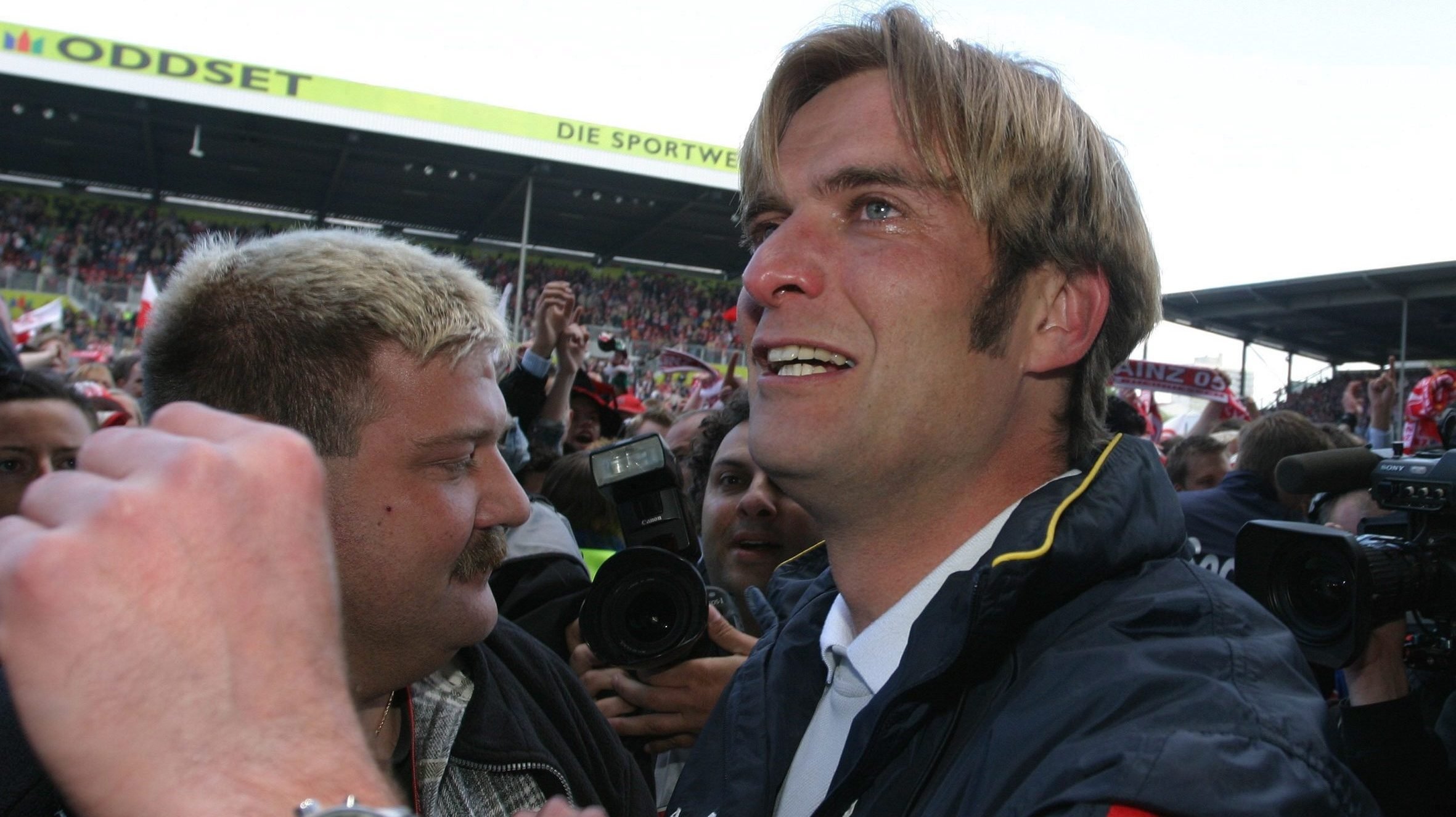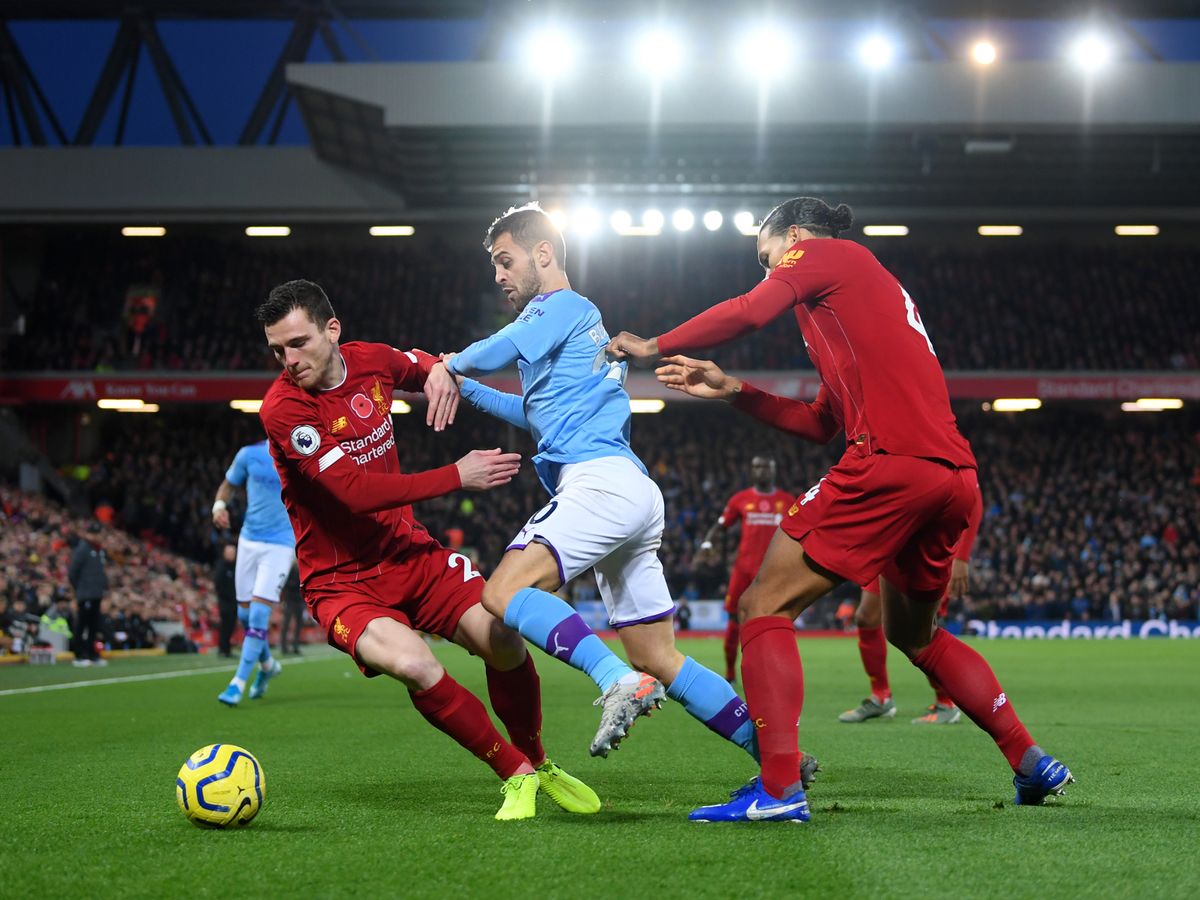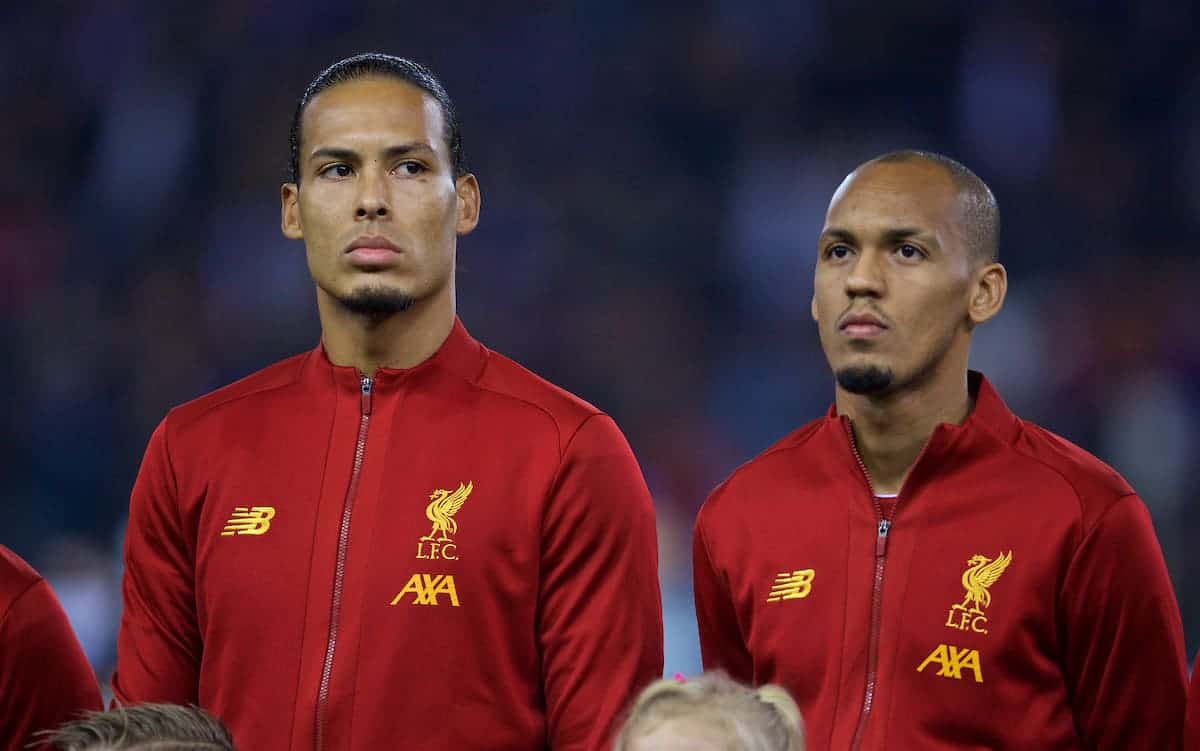On the 8th of October 2015, Jürgen Klopp took over from Brendan Rodgers as manager of Liverpool FC.
He inherited a squad that looked tired, bereft of ideas but still with some quality pieces to work with.
Klopp wanted Liverpool to play the high octane, running intensive play style that had become his trademark through his career at Mainz and Borussia Dortmund in his native Germany.
The heavy metal football era had begun at Anfield.

Klopp celebrating promotion with Mainz in 2004. Credit: Bundesliga.com
Recruitment was key to the implementation of this style.
It wasn’t just about having good players. It was about having the right players. Much of the business Klopp has done in bringing players into Liverpool is a reflection of that. Left-back Andy Robertson being a prime example.
Coming in for a modest £8 million in 2017 from the recently relegated Hull City, the Scot didn’t exactly create a wave of excitement across the Liverpool fanbase when he arrived.
In fact, it took Robertson a number of months to break into the first team. When he initially arrived, he was understudy to Alberto Moreno.
In the years since, Robertson has gone to become one of the most established and decorated full backs in world football, playing a key role in Liverpool’s success in winning the 2019 UEFA Champions League and the 2019/20 Premier League.
He is known for his hard-working nature, bombing up and down the left wing to both join in the attack and get back defensively.
An anecdotal example of this workhouse mentality that Robertson possesses occurred in a match against Manchester City in January 2018 when he began to press the City possession on his own halfway line and ended the press in City’s own left full-back area when he eventually fouled Nicolas Otamendi.

Robertson battling with Manchester City's Bernardo Silva. Credit: Manchester Evening News
What kind of traits and skills does a player require to play this heavy metal football?
Adam Sullivan is a lecturer at Portobello Institute who spent four years at Liverpool FC, initially joining as a sports scientist and later moving into a role as a fitness coach for the U-23s squad.
While ability is certainly an important factor given the level Liverpool plays at, for Adam, the mentality is as much of a factor as physical gifts.
“I think the biggest thing is the willingness to actually do it more than the physical ability. That’s what sets the players apart.
“Players that come to mind are Andy Robertson and Roberto Firmino.
“Players that do the dirty work. They obviously have the physical capacities to do that with the willingness on top,” he said.
Football can often be about the having biggest and best names. Certainly, signing a famous name brings excitement to a set of supporters and revenue to a club in terms of shirt sales and sponsorship.
But throwing together a group of superstar players without any real plan beyond that isn’t quite the recipe for success.
For example, if you take a short trip from Liverpool, down the M62, to Manchester, you can see this in action.
Summer 2021 saw Manchester United sign Jadon Sancho from Borussia Dortmund and Raphaël Varane from Real Madrid. Two players regarded as two of the best in their respective positions.
They then went a step further, bringing Cristiano Ronaldo back to Old Trafford in one of the biggest signings football has seen in recent years.
These signings joined a squad that had already, at that point, racked up a bill in the hundreds of millions. On paper, United looked like one of the best teams in the league and in a strong position to challenge their cross-city rivals Manchester City for their Premier League title.
However, at the time of writing, they currently sit fourth in the league table, 27 points away from City. They were unceremoniously dumped out of the FA Cup by Championship side Middlesbrough and they were also beaten in the third round of the EFL Cup by West Ham United.
All of this to say that the right players often times are more important than the best players, something Adam agrees with.
“Absolutely it’s very important. Some of the players have come in that were relatively unknown. It’s about fitting with that style of play.
“Even the most technically gifted players can struggle.
“With Thiago, you could see how that affected him as a technical player. From an outside point of view, it seems that he’s adapted his style of play a little bit.
“It’s not a case of getting the best players, plugging them in and hoping for the best,” he said.
Finding the right players is central to Jürgen Klopp’s plan for Liverpool and, while fans may get frustrated at times at the lack of marquee signings, the proof is in the very successful pudding.
Liverpool won four trophies in two seasons including the elusive first Premier League trophy that had evaded their grasp since the rebrand of the old First Division in 1992.
It is not to say that Liverpool didn’t splash the cash. They did, when necessary, in the cases of Virgil Van Dijk, Alisson Becker and Fabinho.

Virgil Van Dijk and Fabinho. Credit: This is Anfield
But for each Van Dijk signing, there are multiple shrewder signings that contribute in less obvious ways.
One thing that each signing, big or small, has in common is the work rate and commitment that Adam mentioned. And it’s something that is reinforced in what he describes as ‘incredibly intense’ training sessions.
“You might see on Soccer AM that sometimes players get asked who the worst trainer is. With the culture at Liverpool, there was none of that. You couldn’t be a worse trainer. If you were, you weren’t getting near the first team.
“Everything was really intense. Everyone trained with maximum intensity where it was required. The sessions were low in volume but high in intensity. Just replicating the style of play. And the only way to replicate that style is to do it in training.
“Any small-sided games, you were trying to reinforce that pattern. It’s getting to the ball as quick as you can, putting your opponents under pressure. If it was in larger games, it’s still the same, just over a larger pitch space. It changes the running demands, but the principles are the same. It becomes a manipulation of that depending on the type of session you want to have,” he said.
It is a footballing philosophy that has drawn scepticism at times, mostly questions around its sustainability from a player performance standpoint. As Adam describes, it was something that players needed to get acclimated with.
“When Jürgen came in, they had a lot of hamstring injuries. It was quite significant when he first arrived.
“The demands were so big, and the players weren’t used to it. The demands jumped up massively.
“In the first three months there was a few hamstring injuries straight away and that showed how intense Jürgen wanted to play and how unprepared the players were for that. It was a challenge.
“Once the players got used to it, it was fine. But that was one thing that was significant, the running demands based on how he wanted to play,” he said.
After a three-season period that saw two Champions League final runs, achieving the most points ever for a runner up in Premier League history, and a 99-point Premier League winning effort, the 2020-21 season saw Liverpool falter.
Third place and 30 points worse off than the previous campaign, critics began to question whether or not Liverpool had simply run out of gas. That the running heavy Klopp style of play was unsustainable. It is not a view that Adam shares.
“You could argue last season the bubble burst a little bit and there were injuries.
“I’m not sure if you can put that down to burnout.
“What’s remarkable is that, given the style of play, they sustained that intensity for that period of time. That’s down to the management of training from the coaches and the players' professionalism in how they looked after themselves.
“Recovery and nutrition. As I said, there’s no worst trainer. There’s no one out of shape. I think that’s a testament to how the players look after themselves repeatedly over the course of a number of seasons,” he said.
Liverpool have bounced back this year. They are second only to a Manchester City side that is in imperious form. They are still fighting on three separate cup fronts also, something that they haven’t done at this stage of a season since Jürgen Klopp’s first season in charge.
If you are interested in any of our sports courses or have any questions you can book a consultation call with our expert sports advisor Jo Shaw here, email jo.shaw@portobelloinstitute.com or call 01 892 0024.
Get Insider Updates: Join Now!
Join our mailing list to receive the latest insights and exclusive content from your chosen department of interest



.png?width=1200&name=Colms%20Sports%20Article%20Feature%20Images%20(9).png)
-1.png?width=352&name=Colms%20Sports%20Article%20Feature%20Images%20(9)-1.png)
-1.png?width=352&name=Colms%20Sports%20Article%20Feature%20Images%20(12)-1.png)